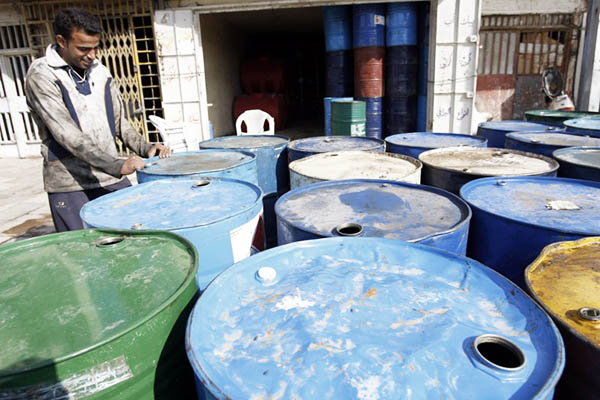
Ali Al-Saadi—AFP
After a devastating last week, prices appear to be stabilizing around $32/barrel.
Oil prices extended their rally in Asia Monday buoyed by hopes of extra stimulus measures in the eurozone and Japan that could help boost demand in the face of a global supply glut.
Prices ended on a buoyant note on Friday, with the U.S. benchmark West Texas Intermediate (WTI) for March delivery soaring nine percent to $32.19 a barrel, while Brent soared 10 percent to $32.18. The upward momentum continued in Asia on Monday, with WTI up 14 cents, or 0.43 percent, at $32.33 and Brent 17 cents, or 0.53 percent, up at $32.35.
Michael McCarthy, chief market strategist at CMC Markets Australia, said a report showing that private sector business activity in the eurozone continued to expand in January boosted hopes for oil demand catching up with the oversupply.
Data monitoring company Markit said its closely watched composite Purchasing Managers Index (PMI) fell to 53.5 points in January from 54.3 in December. While the figure was an 11-month low it was still well above the 50-point level that separates growth and contraction in the 19-nation bloc.
On Thursday European Central Bank chief Mario Draghi signaled further stimulus measures for the region, while a report in the respected Nikkei business daily Friday said the Bank of Japan is also considering extra measures. “The demand side of the situation was what was worrying us. Now that we’ve seen evidence to support that, we’ve had a lot of short-term interests in the market having to cover. It’s a good old-fashioned scramble,” he told AFP from Sydney. “Combined with a strong economy in the U.S., the demand side of the equation remains on track to catch up with supply about 12 months out.”
Sanjeev Gupta, head of the oil and gas practice at professional services firm EY, said prices also got a boost from the severe snowstorm that battered the U.S. East Coast over the weekend as demand for heating oil rose. However, some analysts remain wary of calling a bottom, especially with Iranian crude poised to return to the market within months following the lifting of western economic sanctions linked to its nuclear program.
